#ionic android app development
Explore tagged Tumblr posts
Text
Ionic Framework Demystified: Unveiling its Benefits and Advantages
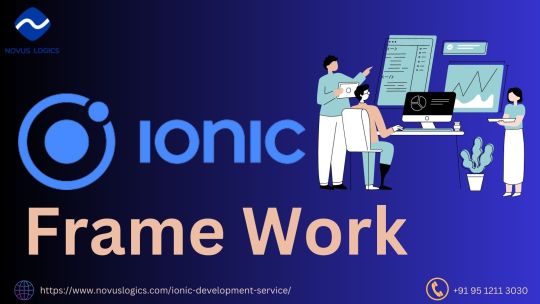
Today, people prefer using mobile phone apps to order food or groceries and complete other tasks. Therefore, more app developers opt for cross-platform app development to cater to the demand for on-demand mobile apps across multiple platforms like Android and iOS. This technique facilitates the creation of apps that work on different platforms by coding once. If you plan to build an app, you can adopt this approach. However, you need to determine the most suitable framework for your requirements.
Companies choose a framework to provide consistent user experiences on various web, desktop, or mobile platforms. Ionic is a framework that helps developers create apps faster than native app development. Ionic android app development also saves time and money when making these hybrid apps.
Popularity of Ionic Framework
Ionic is a popular choice for enterprise mobile app development. It has a wide user base of 5 million developers globally, and many enterprise customers trust ionic mobile app development service to create important apps for their internal and external customers. Ionic powers 15% of apps in app stores, and countless more are built internally by businesses to fulfil various needs.
Benefits of Ionic app development
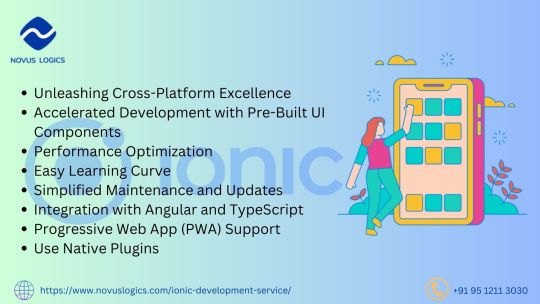
Unleashing Cross-Platform Excellence:
Ionic makes it easier to develop mobile apps for multiple platforms. This is because it offers cross-platform compatibility, which means that developers can write a single codebase using web technologies like HTML, CSS, and JavaScript. This codebase can then be deployed on iOS and Android platforms. This cross-platform capability saves development time and reduces costs by eliminating the need for separate codebases.
Accelerated Development with Pre-Built UI Components:
Ionic offers a rich library of pre-built UI components and themes, significantly expediting development. These components are made to blend in perfectly with each platform's native appearance and ambiance. This ensures that users will have the same coherent experience regardless of the device they use. With ready-to-use UI components, developers can focus more on app functionality and logic rather than spending excessive time designing and styling.
Performance Optimization:
By leveraging Cordova, Ionic apps can access native device features, such as camera, geolocation, and accelerometer, enhancing the overall user experience. Additionally, Ionic's performance optimization techniques, like hardware acceleration and caching, ensure smooth app performance, reducing loading times and enhancing responsiveness.
Easy Learning Curve:
One of the significant advantages of the Ionic Framework is its ease of use. With its foundation in web technologies, developers familiar with HTML, CSS, and JavaScript can quickly adapt to Ionic's development environment. Ionic provides comprehensive documentation, tutorials, and a vibrant community that offers support, making it accessible for developers at all skill levels. This low learning curve lets developers quickly prototype and iterate their app ideas, saving time and effort.
Simplified Maintenance and Updates:
Mobile app maintenance and updates can be challenging, especially with multiple platforms. Ionic simplifies this process by allowing developers to change a single codebase, which can be instantly reflected on both iOS and Android platforms. This ease of maintenance streamlines bug fixes, feature updates, and overall app enhancements, ensuring consistent performance across all devices.
Integration with Angular and TypeScript:
Ionic is built on Angular, a popular JavaScript framework for building web applications. By combining the power of Angular with Ionic, developers can leverage the benefits of a structured framework with robust features, including two-way data binding, dependency injection, and modular architecture. Furthermore, Ionic supports TypeScript, a typed superset of JavaScript, which enhances code reliability, improves developer productivity, and enables better error detection during the development process.
Progressive Web App (PWA) Support:
Ionic embraces the concept of Progressive Web Apps (PWAs), web applications that can be installed and run like native apps. With Ionic, developers can easily transform their apps into PWAs, making them accessible via a web browser and downloadable from app stores. This approach allows businesses to reach a wider audience and offers users the convenience of accessing apps without installing them while still providing a native-like experience.
Use Native Plugins
Ionic provides native plugins that are maintained by the Ionic team to simplify app development. These plugins offer commonly used native features in enterprise app development. The custom development options in Ionic also address native device requirements. Moreover, using Cordova plugins, designers can access various components, and developers can access features like flashlights, GPS, cameras, etc.
Visit :
Why Enterprises Should opt For PHP development services?
Top Features of the Ionic Framework
Discover the top features of the Ionic Framework for constructing mobile applications that can run on multiple platforms. You can hire best Ionic app developers to use these features.
Intuitive User Interface:
One of the standout features of the Ionic Framework is its intuitive user interface. It offers pre-designed UI components, including buttons, lists, forms, and navigation patterns. These easily customizable components allow developers to create visually appealing and user-friendly interfaces. With Ionic, developers can deliver a seamless user experience across different platforms, making their apps feel native to each operating system.
Cross-Platform Compatibility:
The Ionic Framework allows developers to build cross-platform applications using a single codebase. By leveraging technologies like HTML, CSS, and JavaScript, Ionic enables developers to write code once and deploy it across various platforms, such as iOS, Android, and the web. This significantly reduces development time and effort, making Ionic an efficient choice for businesses looking to reach a wider audience.
Native Performance:
While cross-platform frameworks often face performance issues, the Ionic Framework stands out in native performance. By utilizing native device functionalities and leveraging hardware acceleration, Ionic apps can deliver near-native performance. Moreover, Ionic apps are equipped with a native-style user interface, providing users a smooth and responsive experience. This native performance aspect of Ionic makes it a preferred choice for building high-performance mobile applications.
Extensive Plugin Ecosystem:
The Ionic Framework has a vast ecosystem of plugins and extensions, allowing developers to access a wide range of native features. Ionic provides a plugin for almost every requirement, Whether accessing the camera, GPS, or integrating with popular social media platforms. These plugins can be easily integrated into the Ionic app, enabling developers to harness the full potential of the underlying platform. Ionic's extensive plugin ecosystem enhances the apps' functionality and offers developers greater flexibility.
Live Reload and Debugging:
Ionic offers a powerful development environment with features like live reload and debugging. With live reload, developers can instantly see the changes they make in the code without rebuilding the entire app. This feature significantly speeds up the development process, allowing developers to iterate and fine-tune their apps more efficiently. Additionally, Ionic provides robust debugging tools, which enable developers to identify and fix issues quickly, ensuring the smooth functioning of their applications.
Theming and Customization:
Branding plays a crucial role in creating a unique identity for mobile applications. The Ionic Framework provides extensive theming and customization options, allowing developers to tailor the app's appearance to match their brand's aesthetic. Developers can easily customize colors, typography, and styles, ensuring a consistent and visually appealing user interface. Ionic's theming and customization capabilities empower businesses to create apps that align with their brand identity and captivate their target audience.
Seamless Integration with Angular:
Angular is a popular JavaScript framework used for building robust web applications. Ionic seamlessly integrates with Angular, harnessing its power to create feature-rich mobile apps. Developers familiar with Angular can easily leverage their existing knowledge to build Ionic applications. This integration simplifies the development process and enables developers to leverage the extensive Angular ecosystem, including libraries and tools, to enhance their Ionic apps.
Ionic Capacitor:
Ionic Capacitor is a tool that enables you to convert a web project into a native iOS or Android mobile app. It provides basic JavaScript for easy access to common device features. Additionally, it grants complete access to the native operating system when required. Ionic Framework further enhances Capacitor by offering many mobile-optimized UI components, including mobile routing, navigation, gestures, and animations.
Conclusion
The Ionic Framework is a comprehensive solution for constructing powerful and efficient mobile applications. With its intuitive user interface, cross-platform compatibility and seamless integration with Angular, the Ionic Framework offers businesses the perfect blend of development time efficiency and user experience excellence. Moreover, its theming and customization options empower businesses to create captivating apps that match their brand identity. It is best to consult with the ionic app development company Ahmedabad to maximise these features effectively. They have the expertise and resources to make the most of these features. With their help, businesses can create powerful, engaging mobile applications that stand out.
Frequently Asked Questions (FAQs)
How to create an Ionic app for Android?
To create an Ionic app for Android, install Ionic CLI, create a new project, and run the app using the "ionic cordova run android" command.
Is Ionic used for mobile app development?
Yes, Ionic is widely used for mobile app development, allowing developers to build cross-platform applications using web technologies.
Which is better, Ionic or Android Studio?
Ionic is preferred for cross-platform apps, while Android Studio is used mainly for developing Android applications. The choice of tool depends on the desired platform.
What is Ionic app development?
Ionic app development is building mobile applications using Ionic, an open-source framework for cross-platform application development. Ionic enables developers to write code once and deploy it across multiple platforms by leveraging web technologies such as HTML, CSS, and JavaScript.
#ionic app development#ionic#Ionic app for Android#ionic android app development#Hire Best ionic app developers#ionic app development company Ahmedabad
0 notes
Text

Experience the power of seamless integration with IONIC app development! Our expert team ensures your app provides a superior user experience across all platforms. Let's build something amazing together! 🔗Learn more: https://greyspacecomputing.com/ionic-mobile-app-development-services/ 📧 Visit: https://greyspacecomputing.com/portfolio/
#IONIC#GreySpaceComputing#CrossPlatform#MobileApp#AppDevelopment#ionicframework#webdevelopment#IONICIntegration#mobileapps#UserExperience#apps#PerformanceBoost#appdevelopment#apppresser#appbuilding#customapps#plugins#ecommerce#iosapps#androidapps#developers#wordpressdevelopers#phonegap#pushnotifications#wordpressmobileapp#iosappdev#androidappdev#wordpressmobileapps#ionic#android
1 note
·
View note
Text
Native vs. Hybrid Mobile App Development: Making the Right Choice
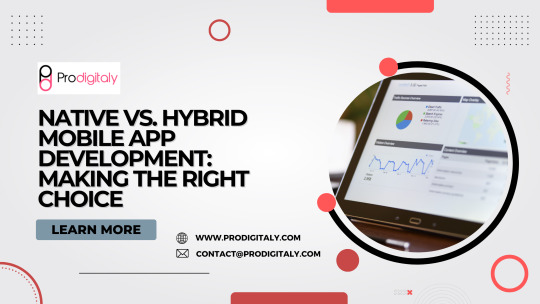
Introduction
In the rapidly evolving landscape of mobile technology, businesses are presented with a crucial decision when developing mobile applications: Should they opt for native app development or go the hybrid route? This decision significantly affects user experience, development cost, and time-to-market. This comprehensive guide will delve into the differences between native and hybrid mobile app development and help you make an informed choice for your project.
Understanding Native App Development
Native apps provide unparalleled performance and seamless integration with the device's hardware and software. They offer a superior user experience due to their responsiveness and access to platform-specific features. involves creating applications designed to run on a specific platform or operating system, such as iOS or Android. These apps are built using platform-specific programming languages like Swift for iOS and Java/Kotlin for Android. Native App Development
The Benefits of Native App Development
1. Performance:
Native apps are optimized for the specific platform they are developed for, resulting in better performance and smoother user interactions.
2. User Experience:
Native apps provide a consistent and intuitive user experience, adhering to the design guidelines of each platform. It contributes to higher user engagement and satisfaction.
3. Access to Device Features:
Native apps can leverage device-specific features like GPS, camera, and push notifications, enhancing the app's functionality.
4. Offline Functionality:
Native apps often function offline, allowing users to access certain features without an internet connection.
Challenges of Native App Development
1. Cost and Time:
Developing separate apps for different platforms can be time-consuming and expensive. It requires hiring specialized developers for each platform.
2. Updates:
Managing updates and bug fixes for multiple native apps can be challenging, especially if the development team is not well-equipped.
Understanding Hybrid App Development
Hybrid app development aims to create applications that run on multiple platforms using a single codebase. These apps are typically built using web technologies like HTML, CSS, and JavaScript, wrapped in a native container. This approach allows developers to write code once and deploy it across different platforms, saving time and resources.
The Benefits of Hybrid App Development
1. Cost-Efficiency:
Since a single codebase is used for multiple platforms, development costs are significantly lower than native app development.
2. Faster Development:
Building a hybrid app is shorter due to the reuse of code across platforms, resulting in quicker time-to-market.
3. More accessible Updates:
Updating a hybrid app involves changing the shared codebase, simplifying the process, and ensuring platform consistency.
4. Wide Reach:
Hybrid apps can reach a broader audience as they are compatible with iOS and Android devices.
Challenges of Hybrid App Development
1. Performance:
Hybrid apps sometimes lag behind native apps, especially for complex animations and intensive graphics.
2. Limited Access to Device Features:
While hybrid apps can access certain device features, they might not offer the same level of integration as native apps.
3. User Experience:
Due to platform-specific design guidelines and differences, achieving a seamless user experience across different platforms can be challenging.
Making the Right Choice
When deciding between native and hybrid mobile app development, consider the following factors:
1. App Complexity:
For complex apps that require intensive graphics or intricate interactions, native development might be more suitable.
2. Budget:
Hybrid development could be cost-effective if you have budget constraints and want to develop for both platforms.
3. Time-to-Market:
If speed is crucial, hybrid development can help you launch your app faster.
4. User Experience:
If delivering a seamless and platform-specific user experience is your priority, native development is the way forward.
5. Long-Term Goals:
Consider your app's long-term goals and the potential need for ongoing updates and improvements.
Finding the Right Mobile App Development Company
Whether you choose native or hybrid development, partnering with the right mobile app development company is crucial for success. Look for a company that specializes in both web and mobile app development. Consider their expertise in native and hybrid approaches, portfolio, client reviews, and ability to understand your project's unique requirements.
Conclusion
In the realm of mobile app development, choosing between native and hybrid approaches is a decision that requires careful consideration. Native apps offer unparalleled performance and user experience, while hybrid apps provide cost-efficiency and quicker development. Ultimately, the right choice depends on your project's complexity, budget, and goals. Whichever path you choose, collaborating with a reputable mobile app development company will ensure your project's success in the competitive app market.
#digital marketing company#application for android app development#digital marketing company in indore#facebook ad campaign#google ads management services#flutter app development company#facebook ad agency#ios app development company in india#ionic app development company#facebook ads expert
0 notes
Text
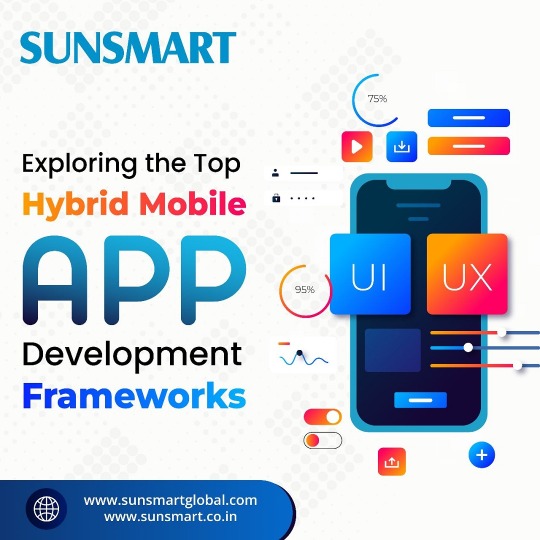
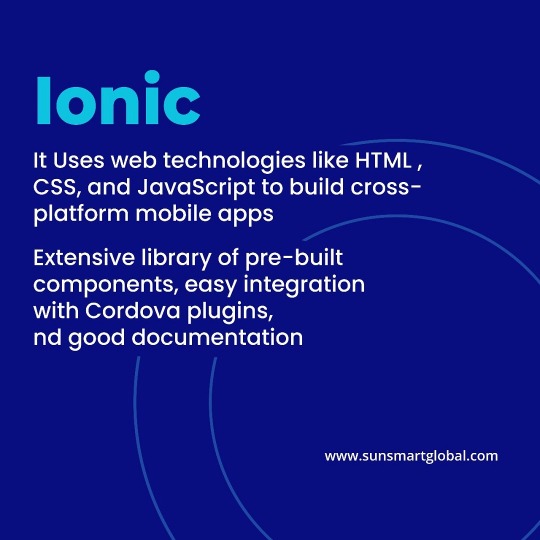
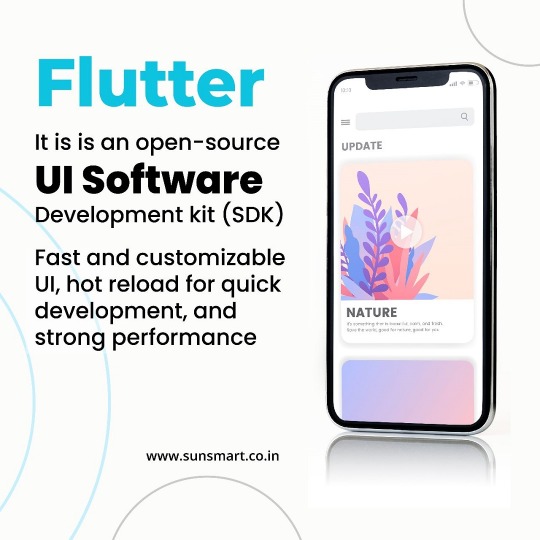
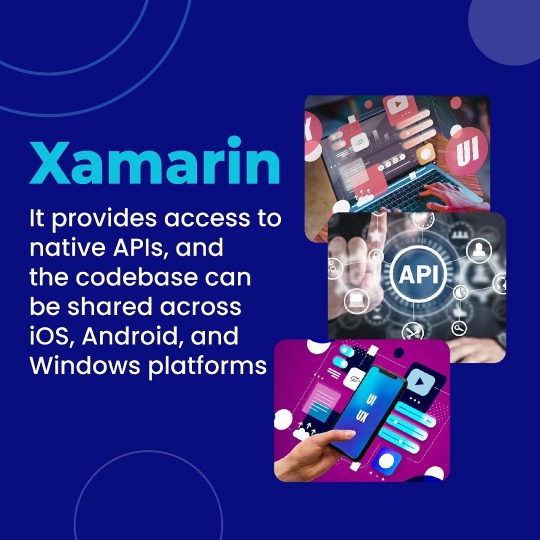
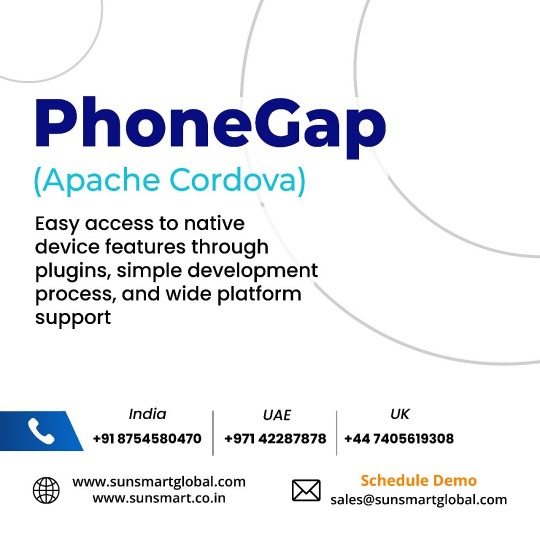
#hybrid app development#mobile app development#android#ios#flutter#ionic#xamain#phonegap#software development
0 notes
Text

Navigating the Complex World of Mobile App Development
In today’s tech-driven world, mobile apps have become a cornerstone of how we connect, work, and play. Whether you’re launching a startup or enhancing an established business, building a mobile app can be a game-changing move. One of the most important decisions you’ll face is choosing the right technology stack. The tech stack you pick will directly influence your app’s performance, scalability, and overall user experience.
What Exactly Is a Tech Stack?
A tech stack is essentially the set of tools, programming languages, and frameworks you use to build your app. For mobile apps, the stack typically consists of three main components:
Front-End: This is what users see and interact with — the app’s interface.
Back-End: This is the engine under the hood — handling data storage, processing, and integrations.
Platform: The operating system your app is built for, like iOS, Android, or both.
Key Considerations When Picking a Tech Stack
Let’s dive into the options and what you should think about when deciding which tools to use.
Platform Options
Native Development
Languages:
iOS: Swift or Objective-C
Android: Kotlin or Java
Pros:
Best-in-class performance.
Full access to device features like cameras, sensors, and GPS.
Cons:
Higher costs.
Longer development time if building for both iOS and Android.
2. Cross-Platform Development
Frameworks:
React Native (JavaScript and React)
Flutter (Dart)
Xamarin (C#)
Pros:
Faster development.
Reusable code for both iOS and Android.
Generally lower costs.
Cons:
Slightly lower performance compared to native apps.
Limited access to some advanced native features.
3. Hybrid Development
Tools:
Ionic (HTML, CSS, JavaScript)
PhoneGap/Cordova (HTML, CSS, JavaScript)
Pros:
Easy to learn and work with if you’re familiar with web development.
Leverages standard web technologies.
Cons:
Performance is not as strong as native or well-optimized cross-platform apps.
User experience can feel less “native.”
How to Make the Best Choice for Your App
Your decision will depend on several factors. Here are some key points to consider:
App Complexity:
For simple apps, cross-platform frameworks like React Native or Flutter are great choices.
For feature-heavy or complex apps, native development might be the way to go.
Time to Market:
If you’re on a tight schedule, cross-platform tools can speed up the process.
Budget:
Native development can be pricey since you’ll likely need separate teams for iOS and Android.
Cross-platform and hybrid options are usually more cost-effective.
Performance Needs:
Native apps deliver the best performance, but modern cross-platform frameworks have come a long way and can handle most needs efficiently.
Team Expertise:
Leverage the skills your team already has. If they’re experienced in JavaScript, for example, React Native might be a natural fit.
Final Thoughts
Choosing the right tech stack is a pivotal step in mobile app development. It’s about finding the perfect balance between your project’s requirements, your budget, and your team’s expertise. By weighing factors like app complexity, performance, and cost, you can make a well-informed choice that sets your app up for success. Remember, a solid tech stack is the foundation of a scalable, user-friendly, and high-quality app.
#mobile app development#android development#ios development#hybrid app development#cross platform app development#technology#software development#programming
2 notes
·
View notes
Text
Transforming Businesses with DI Solutions: Innovative IT Expertise
Transform your business with DI Solutions

In the ever-evolving digital landscape, businesses must harness cutting-edge technology to remain competitive. At DI Solutions, we specialize in driving business transformation through advanced IT solutions and expert services. Our dedication to innovation and excellence has empowered numerous clients to achieve their goals and excel in their industries.
Innovative IT Solutions DI Solutions excels in providing tailored IT solutions that meet each client's unique needs. Our services include custom software development, mobile app creation, web development, and UI/UX design. By leveraging the latest technologies, we deliver state-of-the-art solutions that enhance growth and efficiency.
Expert Team of Professionals Our team consists of highly skilled professionals—creative designers, experienced developers, and strategic problem-solvers. We emphasize continuous learning to stay at the forefront of industry trends and technological advancements, ensuring that our clients receive the most effective and innovative solutions.
Global Reach and Impact
With over a decade of experience, DI Solutions has made a significant impact globally, partnering with more than 120 clients across North America, Europe, Asia, and Australia. Our extensive global presence demonstrates our capability to provide exceptional IT services that address diverse business needs.
Client-Centric Approach
At DI Solutions, clients are central to our mission. We take the time to understand their business objectives, challenges, and requirements, enabling us to deliver customized solutions that surpass expectations. Our client-centric approach ensures we provide not just what is needed but what drives success and growth.
Comprehensive IT Services
Our service offerings include:
Custom Software Development: Tailored software solutions for optimal efficiency and performance.
Mobile App Development: Innovative mobile applications for Android and iOS platforms.
Web Development: Expert web development to create responsive and user-friendly websites.
UI/UX Design: Engaging user interfaces that enhance the overall user experience.
Quality Assurance: Rigorous testing to ensure the highest quality standards.
DevOps Services: Streamlined operations through integrated cultural philosophies, practices, and tools.

Join Hands with DI Solutions
Partner with DI Solutions to harness the power of innovative IT expertise. Whether you’re a startup aiming to establish a presence or an established business seeking new heights, we have the solutions and expertise to propel you forward.
For more information, visit our website or contact us directly. Let’s embark on a journey of transformation and growth together.
Transform your business with DI Solutions – where innovation meets excellence.
Contact Us Website: https://disolutions.net/ Email: [email protected] , Call: 91-9904566590 , B-301, 307, 406 Apex Commercial Center, Varachha Road, Nr. Yash Plaza, Surat, Gujarat,India-395006.
youtube
#disolutions #DI Solutions #Hire Angular.js Developers #Hire React.js Developers #Hire Vue.js Developers #Hire UI/UX Developers #Hire .NET Developers #Hire Node.js Developers #Hire Laravel/PHP Developers #Hire Android Developers #Hire IOS Developers #Hire Ionic Developers #Hire React Native Developers #Hire Full Stack Developers #Hire MERN Stack Developers #Hire MEAN Stack Developers #Mobile App Development #Web Development #UI/UX Design #Quality Assurance #DevOps Services
2 notes
·
View notes
Text
Top Mobile App Development Frameworks in 2023 - Lode Emmanuel Palle
As of my last knowledge update in September 2021, I can provide information about some of the popular mobile app development frameworks up to that point. However, please note that the landscape of technology can change rapidly, and new frameworks may have emerged or gained popularity since then. Here are some of the well-known mobile app development frameworks mentioned by Lode Emmanuel Palle that were popular up to 2021:
React Native: Developed by Facebook, React Native is a widely used open-source framework for building cross-platform mobile apps. It allows developers to use JavaScript to create native-like user interfaces for both iOS and Android.
Flutter: Created by Google, Flutter is another popular open-source framework for building cross-platform apps. It uses the Dart programming language and provides a rich set of customizable widgets, enabling high-quality and performant user interfaces.
Xamarin: Owned by Microsoft, Xamarin allows developers to build native apps for iOS, Android, and Windows using a single codebase in C#. It provides a way to share a significant portion of code across platforms while still delivering native user experiences.
Ionic: Built on top of Angular and using web technologies like HTML, CSS, and JavaScript/TypeScript, Ionic is a framework for building cross-platform mobile apps with a native-like feel. It also provides a suite of UI components.
Vue Native: Based on Vue.js, Vue Native lets developers build mobile apps using Vue's declarative syntax. It's designed to be similar to React Native, making it easy for developers familiar with Vue.js to transition to mobile development.
PhoneGap / Apache Cordova: PhoneGap is an open-source framework that uses web technologies to build mobile apps that can run on various platforms. It leverages Apache Cordova to access native device features.
SwiftUI (for iOS): Introduced by Apple, SwiftUI is a framework for building user interfaces across all Apple platforms using Swift programming language. It's mainly focused on iOS, macOS, watchOS, and tvOS app development.
Kotlin Multiplatform Mobile (KMM): Developed by JetBrains, KMM is a relatively new framework that aims to allow developers to share code between Android and iOS apps using Kotlin. It's designed for more seamless cross-platform development.
NativeScript: NativeScript enables building native apps using JavaScript, TypeScript, or Angular. It provides access to native APIs and components, offering a truly native experience.
According to Lode Emmanuel Palle. the choice of a mobile app development framework depends on various factors including your familiarity with the programming language, the complexity of the app, the desired platform(s), and the specific features you need. It's always a good idea to research and stay updated on the latest developments in the field to make informed decisions.
9 notes
·
View notes
Text
Empowering Businesses with Ionic App Development Services
In the dynamic landscape of mobile app improvement, corporations are constantly in search of revolutionary solutions to interact with their target market efficaciously. With the proliferation of smartphones and tablets, having a sturdy mobile presence has come to be imperative for staying competitive in the present-day market. This is wherein Ionic app development businesses step in, imparting flexible and green solutions to build cross-platform cellular packages that captivate customers and power business increase.
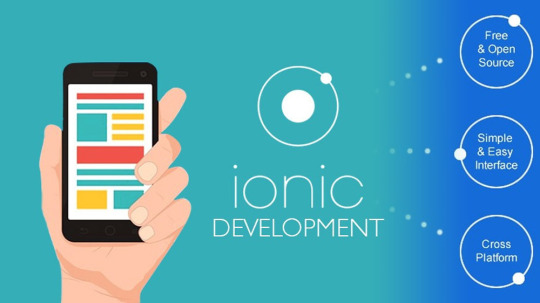
Unveiling the Power of Ionic App Development
Ionic is an open-source framework that lets builders build fantastic, function-wealthy cellular packages using internet technology which includes HTML, CSS, and JavaScript. Leveraging web technology permits Ionic app development companies to create go-platform programs that run seamlessly on diverse devices and working structures, consisting of iOS, Android, and the web.
1. Cross-Platform Compatibility:
One of the key advantages of Ionic app development is its potential to create cross-platform programs with a single codebase. This drastically reduces development time and costs, as developers can write as soon as possible and deploy throughout multiple systems, making sure of consistency in personal enjoyment throughout gadgets.
2. Native-Like Performance:
Despite being constructed with net technologies, Ionic packages offer native-like overall performance and responsiveness. Through technology like Capacitor or Cordova, Ionic apps can get the right of entry to device capabilities and APIs, turning in a continuing consumer experience with smooth animations, rapid loading instances, and fluid navigation.
3. Rapid Development Cycle:
Ionic's development environment is characterized by its simplicity and simplicity of use, facilitating a fast improvement cycle. With features like Ionic CLI (Command Line Interface) and Ionic DevApp, developers can streamline the development technique, iterate speedy, and take a look at their applications in actual time throughout multiple devices.
4. Extensive UI Component Library:
Ionic comes with a rich set of pre-designed UI additives and layouts, allowing builders to create visually attractive and intuitive personal interface results easily. From buttons and paperwork to navigation bars and modals, Ionic's UI thing library empowers builders to construct polished and expert-looking applications with minimal attempts.
5. Community Support and Ecosystem:
The Ionic framework boasts a colorful community of builders, designers, and lovers who actively contribute to its surroundings. From open-supply plugins and extensions to comprehensive documentation and tutorials, the Ionic network affords helpful resources and support, fostering collaboration and innovation in app development.
Industries Leveraging Ionic App Development Services
1. E-Commerce:
Ionic app improvement agencies cater to the growing desires of e-trade organizations through building characteristic-wealthy buying apps, inventory control structures, and customer engagement structures. These applications allow e-commerce manufacturers to supply seamless shopping reports, customized tips, and stable payment gateways to their clients.
2. Healthcare:
In the healthcare enterprise, Ionic apps are utilized to create telemedicine systems, patient portals, appointment scheduling structures, and health tracking programs. These apps enhance accessibility to healthcare services, facilitate remote consultations, and empower sufferers to manipulate their health correctly from their cell devices.
3. Education:
Educational establishments and e-gaining knowledge of structures leverage Ionic app improvement offerings to create interactive knowledge of apps, online course platforms, and educational video games. These applications guide far-off mastering, personalized education, and knowledge dissemination, catering to the numerous needs of college students and educators globally.
4. Finance:
Ionic apps are revolutionizing the finance zone by imparting answers together with cell banking apps, virtual wallets, and funding systems. With sturdy security features and seamless personal reports, Ionic-powered finance apps allow people to manage their budgets comfortably and securely on the go.
5. Travel and Hospitality:
Ionic app improvement businesses play an important position in growing travel reserving systems, inn reservation systems, and tour courses for the travel and hospitality industry. These programs provide intuitive interfaces, actual-time updates, and seamless booking reviews, enhancing the overall journey experience for users internationally.
Conclusion
Ionic app improvement organizations are at the leading edge of innovation within the cellular app improvement landscape, empowering organizations across diverse industries to construct compelling and function-rich packages that resonate with their target audience. With its cross-platform compatibility, native-like performance, and giant surroundings, Ionic offers a versatile and efficient framework for growing mobile applications that drive engagement, enhance the personal experience, and propel enterprise boom in the state-of-the-art virtual era.
2 notes
·
View notes
Text
App Development frameworks
How do the most popular app development frameworks contribute to mobile app development?
In today’s digital landscape, mobile applications (app development frameworks) have become a necessity for businesses to reach their target audience effectively. With the ever-growing demand for innovative and user-friendly mobile applications, developers are constantly seeking efficient ways to build high-quality applications in very little time. This is where mobile app development frameworks come into play. The frameworks provide a foundation for developers to create cross-platform mobile applications that work seamlessly across various devices and OSes.
Development Frameworks Used for Developing Mobile Applications
Most popular app development frameworks
React Native (developed by Facebook) — This framework has gained immense popularity among developers due to its ability to build native-like mobile apps using JavaScript. It allows them to write the codes once and deploy them on both Android and iOS platforms. Hire React Native developers to obtain cross-platform mobile app solutions for iOS, Android, and the web and enjoy benefits like reduced costs and time and enhanced productivity and profitability. app development frameworks
Flutter (backed by Google) — Flutter uses the Dart programming language and provides a rich set of customizable widgets, enabling developers to create visually appealing and responsive applications. Its hot reload feature helps the developers change the codes in real time and obtain immediate visual updates. If you opt to hire Flutter developers, your cross-platform applications will have a quicker time-to-market with a single codebase for all the platforms. app development frameworks
Ionic (open-source framework) — It uses technologies like HTML, CSS, and JavaScript in the development of cross-platform mobile applications. It enables developers to provide end users with a consistent user experience across multiple platforms. It will be a smart choice to hire Ionic developers when it comes to obtaining a feature-rich cross-platform mobile application. app development frameworks
Kotlin (open source, originated at JetBrains) — This is another app development framework that allows developers to share codes between Android and iOS platforms. It seamlessly works with Android Jetpacks (a tool provided by Google). Hire Kotlin developers to enjoy improved app performance and a better user experience with access to modern technologies. app development frameworks
Hire Experts
In today’s mobile-driven world, mobile app development has become a crucial aspect of achieving business success. Hiring the right mobile app developer is essential to obtaining a high-quality application. With various frameworks available, such as React Native, Flutter, Ionic, and Kotlin, selecting the ideal developer can be challenging. A skilled developer can help you cut down on the cost of application development. Correspondingly, it will lead to an increase in the ROI value. Hire the best developers from WEBSTEP Technologies. Visit https://www.webstep.in to obtain more information and connect with them to acquire a cutting-edge mobile solution for your business. app development frameworks
2 notes
·
View notes
Text
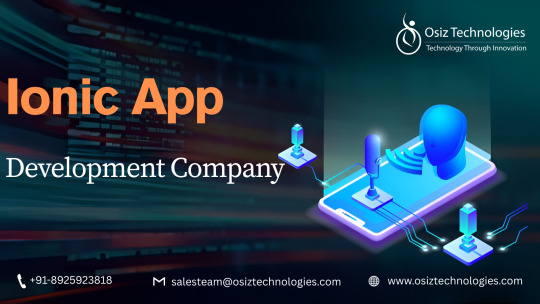
Top Ionic App Development Company - Osiz
Looking for a reliable Ionic app development company? Osiz Technologies stands out as a premier provider of cross-platform mobile solutions using the Ionic framework. With a team of skilled developers and a proven track record, Osiz builds robust, user-friendly hybrid apps tailored to your business goals. Whether you're a startup or enterprise, they deliver feature-rich applications with stunning UI/UX across Android and iOS. Partner with Osiz to turn your app ideas into high-performance mobile experiences.
0 notes
Text
Top Hybrid Mobile App Development Frameworks You Should Know in 2025
In the ever-evolving digital landscape, one thing is certain—mobile apps are here to stay. With users demanding seamless performance across devices and operating systems, businesses and mobile app developers are turning to hybrid mobile app development frameworks to build faster, smarter, and more efficient solutions.
Hybrid apps, which run on multiple platforms using a single codebase, are revolutionizing the way apps are built and deployed. Whether you’re a budding developer or an app development company looking to streamline workflows, understanding the best frameworks in 2025 is crucial for staying competitive.
So, let’s explore the top hybrid mobile app development frameworks that are leading the charge this year.
What is Hybrid Mobile App Development?
Hybrid mobile app development blends the best of both worlds—native and web. These apps are built using web technologies like HTML, CSS, and JavaScript, but they’re wrapped in a native container that allows them to be installed and run like traditional mobile apps.
This approach means:
Faster development
Lower cost
Single codebase
Wider reach
Access to native device features
No wonder mobile app developers are leaning heavily into this space.
Why Choose Hybrid Over Native?
Here’s why app development services are increasingly recommending hybrid apps:
✅ Time Efficiency: Launch apps faster across iOS, Android, and even the web.
✅ Cost Savings: One team, one codebase—less development overhead.
✅ Easier Maintenance: Update once, apply everywhere.
✅ Access to Native APIs: Use device features like camera, GPS, and push notifications with plugins.
✅ Scalability: Easier to scale across markets and platforms.
If you’re a mobile app developer or a business looking to grow digitally, hybrid is no longer a compromise—it’s often the smarter choice.
The Top Hybrid Mobile App Development Frameworks in 2025
1. Flutter
Developer: Google
Language: Dart
Flutter has become a go-to choice for mobile app developers everywhere. Its lightning-fast performance, customizable widgets, and excellent documentation make it ideal for both startups and enterprises.
Why Developers Love It:
Hot reload speeds up testing.
Beautiful UIs with customizable widgets.
With just one codebase, you can build apps for mobile, web, and desktop—making Flutter super flexible and efficient.
It’s an ideal choice for creating visually appealing apps, real-time experiences, or quick MVPs to test your ideas fast.
2. React Native
Developer: Meta (Facebook)
Language: JavaScript
Still going strong in 2025, React Native enables developers to build apps using the same design principles as React for the web. Its flexibility and wide adoption make it a go-to for many app development companies.
Why It’s Popular:
Write once, use everywhere.
Large community with plugins and libraries.
Plus, when high performance is needed, developers can mix in native code—giving them the best of both worlds.
It’s especially great for visually stunning apps, real-time applications, or when you need to quickly build an MVP
3. Ionic
Developer: Ionic Team
Ionic makes hybrid app development feel effortless by letting developers work with familiar web technologies like HTML, CSS, and JavaScript—no steep learning curve, just smooth, efficient coding.
Ionic is perfect for app development services focused on UI/UX. It’s particularly friendly for web developers looking to transition into mobile app development.
What Makes Ionic Stand Out:
Extensive pre-built UI components.
Seamless PWA development.
It works seamlessly with popular frameworks like Angular, React, or Vue
Best For: E-commerce apps, admin dashboards, and information-based applications.
4. Xamarin (Now .NET MAUI)
Developer: Microsoft
Language: C#
Xamarin has evolved into .NET MAUI (Multi-platform App UI), offering a unified development experience across Android, iOS, macOS, and Windows.
Why Developers Are Switching:
One project for all platforms.
Seamless Visual Studio integration.
Mature and stable with Microsoft backing.
Best For: Enterprise solutions, healthcare, finance, and internal corporate tools.
5. NativeScript
Developer: Progress
Languages: Supports a wide range of modern languages and frameworks, including JavaScript, TypeScript, Angular, and Vue
Whether you're comfortable with Angular, React, or Vue, Ionic blends seamlessly with your preferred framework. If your app needs to tap directly into a device’s hardware or system-level features, NativeScript is a reliable choice that delivers native-like performance with hybrid flexibility.
Key Highlights:
No web views—pure native rendering.
Strong support for popular front-end frameworks.
Highly flexible architecture.
Ideal Use: Apps requiring camera access, GPS, or deep device integrations.
6. Framework7
Developer: Community-driven
Languages: Works seamlessly with popular frameworks like JavaScript, Vue, React, and Svelte
Framework7 might not be as well-known, but it's a gem for building slick, native-feel apps.Why Developers Appreciate It:
Elegant UI elements.
Easy to learn and use.
Great for quick prototypes and MVPs.
Best For: Startups, design-first apps, and quick launch products.
7. Quasar Framework
Developer: Quasar Team
Language: Vue.js
Quasar brings the power of Vue.js to mobile, desktop, and web—all from a single source. Its CLI and component library make development both fast and fun.
Why It’s Rising in Popularity:
Built-in support for Electron, Cordova, and PWAs.
Impressive performance optimization tools.
Strong documentation and support.
Perfect For: Developers who love Vue and want full flexibility across platforms.
Choosing the Right Framework: What to Consider
Not every framework is right for every project. Whether you’re a freelancer or represent an app development company, here are some essential questions to ask:
What’s the goal of the app?
Which platforms are we targeting?
What’s the team’s expertise (JavaScript, Dart, C#)?
What are the performance expectations?
Is scalability a major factor?
Do we need native feature access?
Pro tip: Don’t just follow trends—follow what makes sense for your users and your team.
How Mobile App Developers Can Stay Competitive in 2025
As hybrid frameworks evolve, so must the skills of mobile app developers. Here's how to stay ahead:
Stay updated with framework changes and new releases.
Participate in developer communities and forums.
Use automated testing and CI/CD pipelines.
Integrate AI and Machine Learning where it adds value.
Learn about AR/VR, wearables, and IoT integration.
Being adaptable and tech-savvy isn’t a luxury anymore—it’s a necessity in the app development world.
Future Trends to Watch in Hybrid App Development
The future is already shaping up to be exciting for hybrid apps. Here are trends worth watching:
🚀 AI-Driven Development: Smart code suggestions, bug fixes, and optimization.
🌐 5G + Edge Computing: Supercharged performance for data-heavy apps.
🎮 AR/VR Integration: Immersive experiences built into cross-platform apps.
🎙 Voice and Gesture Interfaces: More intuitive user interactions.
🔐 Security Enhancements: Encrypted storage and privacy-first design.
Final Thoughts
In 2025, hybrid mobile app development is no longer just a budget-friendly option—it’s a strategic choice embraced by startups and enterprises alike. With frameworks like Flutter development, React Native, Ionic, and Quasar, today’s mobile app developers have powerful tools to build sleek, scalable, and high-performing applications.
Whether you’re an individual developer, part of a team, or seeking reliable app development services, choosing the right framework will be one of the most critical decisions in your project.
Partnering with an experienced app development company ensures not only a smoother development process but also long-term app success. So, pick your framework, align it with your goals, and get building—because the future of mobile is hybrid.
Resource: Top Hybrid Mobile App Development Frameworks You Should Know in 2025
0 notes
Text
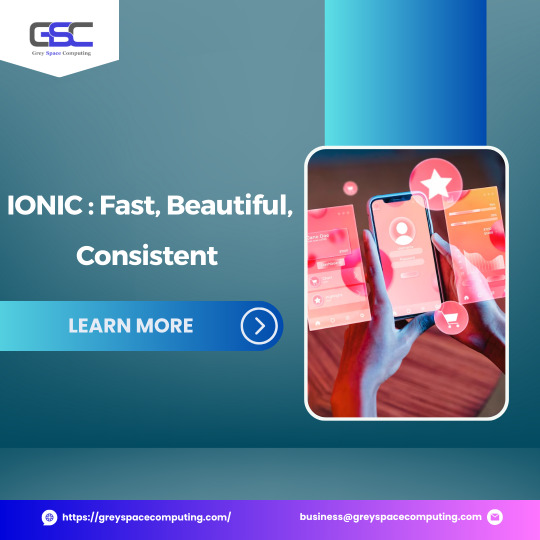
Step into the future of mobile development with IONIC! Our IONIC app development services offer innovative solutions to meet your business needs. Contact us today to start your project! 🔗Learn more: https://greyspacecomputing.com/ionic-mobile-app-development-services/ 📧 Visit: https://greyspacecomputing.com/portfolio/
#IONIC#GreySpaceComputing#CrossPlatform#MobileApp#AppDevelopment#ionicframework#webdevelopment#wordpress#mobileapps#tech#apps#PerformanceBoost#appdevelopment#apppresser#appbuilding#customapps#plugins#ecommerce#iosapps#androidapps#developers#wordpressdevelopers#phonegap#pushnotifications#wordpressmobileapp#iosappdev#androidappdev#wordpressmobileapps#ionic#android
0 notes
Text
#social media marketing services#ionic app development company#social media management services#flutter app development company#web development and design agency#digital marketing company#digital marketing company in indore#react native developer#react native app development company#react native development company#facebook ad campaign#facebook ads expert#facebook ad agency#google ads management services#mobile app development company#mern stack development company#application for android app development#ios app development company in india
0 notes
Text
Xamarin: The Cross-Platform Mobile Development Framework You Should Know
In today’s rapidly evolving mobile app development landscape, businesses and developers are constantly looking for ways to maximize reach while minimizing effort. With multiple mobile operating systems — most notably iOS and Android — developers are often faced with the dilemma of creating separate apps for each platform. Xamarin, a framework powered by Microsoft, has emerged as a robust solution to this problem by enabling developers to build cross-platform mobile applications using a single codebase written in C#. This blog post explores Xamarin in depth — its architecture, features, benefits, limitations, and practical use cases.
What is Xamarin?

Xamarin is an open-source platform for building modern and performant applications for iOS, Android, and Windows with .NET. Originally developed by the team behind Mono and later acquired by Microsoft in 2016, Xamarin integrates with Visual Studio and enables developers to write code in C# or F# that compiles into native code. Unlike hybrid frameworks that rely on WebView components (e.g., Cordova or Ionic), Xamarin offers a more native experience by accessing platform-specific APIs and delivering near-native performance.
Core Components of Xamarin

Xamarin comprises several essential components:
Xamarin.iOS and Xamarin.Android: These are bindings to the iOS and Android SDKs. They allow developers to write platform-specific code in C#.
Xamarin.Forms: A UI toolkit that enables developers to create user interfaces that can be shared across platforms. Xamarin.Forms simplifies UI design by allowing developers to define UIs in XAML and bind them to C# code-behind.
.NET MAUI (Multi-platform App UI): The evolution of Xamarin.Forms, .NET MAUI unifies the development of apps for Android, iOS, macOS, and Windows in a single project.
Mono Runtime: Xamarin uses the Mono runtime, a cross-platform implementation of the .NET Framework, to execute managed code across platforms.
Visual Studio Integration: Xamarin is deeply integrated into Microsoft’s Visual Studio, offering powerful tools for debugging, profiling, and deployment.
Unlock more details here
Why Choose Xamarin?

1. Code Sharing and Reusability
One of the main appeals of Xamarin is its ability to maximize code sharing. Developers can write up to 90% of their codebase in C# and share it across platforms. This reduces development time and cost significantly.
2. Native Performance
Since Xamarin compiles apps into native binaries and provides bindings to native APIs, the resulting applications perform almost as well as those developed using native SDKs.
3. Rich IDE Support
With Microsoft’s backing, Xamarin has deep integration into Visual Studio, one of the most powerful integrated development environments (IDEs). Features such as IntelliSense, debugging, diagnostics, and version control are readily available.
4. Access to Platform-Specific APIs
Xamarin gives developers full access to the platform-specific APIs using C#. You can implement platform-specific functionality without leaving your shared codebase.
5. Strong Community and Ecosystem
With Microsoft’s support and a growing open-source community, Xamarin has extensive documentation, libraries, and third-party tools that simplify mobile development.
Mobile App Development
Framework
0 notes
Text
Mobile development technologies
Mobile development technologies have transformed how businesses connect with customers, offering fast, responsive, and feature-rich applications. The main categories of mobile development are native, hybrid, and cross-platform. Native development uses platform-specific languages like Swift and Objective-C for iOS, and Kotlin and Java for Android, delivering top-tier performance and full access to device features.

Hybrid development blends web technologies such as HTML, CSS, and JavaScript within frameworks like Ionic or Apache Cordova, allowing a single codebase to serve multiple platforms. This approach reduces development time and costs but may sacrifice some performance.
Cross-platform development, with tools like Flutter and React Native, has gained traction for offering near-native performance while sharing most of the codebase across iOS and Android. These frameworks speed up development and are well-suited for startups and businesses seeking cost efficiency.
Other key technologies include Progressive Web Apps (PWAs), which offer app-like experiences via web browsers, and backend services like Firebase that handle databases, authentication, and cloud storage. As mobile technology evolves, trends like AI, machine learning, augmented reality (AR), and the Internet of Things (IoT) are becoming integral to mobile apps, expanding their capabilities.
Selecting the right mobile development technology is critical to creating an app that meets your business needs and delights users.
0 notes
Text
Mobile App Development West Bengal

Introduction: The Rise of Mobile App Development in West Bengal
West Bengal, with Kolkata at its technological helm, has become a key player in India's mobile technology revolution. As smartphones penetrate every layer of society and businesses increasingly adopt mobile-first strategies, the demand for mobile app development in the state has skyrocketed. Whether it's for retail, healthcare, logistics, finance, or education, mobile applications have become the cornerstone of digital transformation. In this SEO-optimized blog, we delve into the intricacies of mobile app development in West Bengal, exploring services offered, top companies, tech stacks, and industry trends that are redefining the app landscape.
Why Mobile App Development is Crucial for Modern Businesses
Mobile applications offer businesses direct access to their target customers and increase operational efficiency through automation and data-driven insights. Here are some reasons businesses in West Bengal are investing in app development:
Direct customer engagement
Increased brand visibility
Real-time updates and support
Streamlined operations
Enhanced customer loyalty
Access to valuable user data
Types of Mobile Apps Developed in West Bengal
1. Native Mobile Apps
Built specifically for Android (Java/Kotlin) or iOS (Swift/Objective-C)
Offer high performance and full device compatibility
2. Hybrid Mobile Apps
Use web technologies like HTML, CSS, and JavaScript
Built with frameworks like Ionic or Apache Cordova
3. Cross-Platform Apps
Developed using Flutter, React Native, Xamarin
Share code across platforms while maintaining near-native experience
4. Progressive Web Apps (PWA)
Work offline and behave like native apps
Built using modern web capabilities
5. Enterprise Mobile Applications
Designed to improve business efficiency and data handling
Includes CRMs, ERPs, field service tools, etc.
Key Mobile App Development Services in West Bengal
1. App Strategy Consulting
Business analysis, app roadmap creation, feature prioritization
2. UI/UX Design
User flow design, wireframes, interactive prototypes, usability testing
3. Mobile App Development
Frontend and backend development, API integration, mobile SDKs
4. App Testing & QA
Manual and automated testing, performance testing, bug fixing
5. Deployment & Launch
Google Play Store and Apple App Store publishing, post-launch monitoring
6. App Maintenance & Support
Regular updates, bug fixes, performance improvements, OS compatibility
Top Mobile App Development Companies in West Bengal
1. Indus Net Technologies (Kolkata)
Full-stack mobile solutions, scalable for enterprise and startup needs
2. Webguru Infosystems (Kolkata)
Cross-platform and native app expertise, strong design focus
3. Capital Numbers (Kolkata)
React Native and Flutter specialists, global client base
4. Binaryfolks (Salt Lake City, Kolkata)
Known for secure and performance-oriented enterprise mobile apps
5. Kreeti Technologies (Kolkata)
Focused on user-centric mobile solutions for logistics and fintech sectors
Leading Industries Adopting Mobile Apps in West Bengal
1. Retail & E-commerce
Shopping apps, inventory management, customer loyalty tools
2. Healthcare
Telemedicine apps, fitness tracking, appointment scheduling
3. Education
eLearning platforms, online exams, student management systems
4. Transportation & Logistics
Fleet tracking, logistics planning, digital proof of delivery
5. Banking & Fintech
Digital wallets, UPI apps, KYC & loan processing apps
6. Real Estate
Virtual tours, property listing apps, customer engagement tools
Popular Technologies & Frameworks Used
Frontend Development:
React Native, Flutter, Swift, Kotlin, Ionic
Backend Development:
Node.js, Django, Ruby on Rails, Laravel
Database Management:
MySQL, Firebase, MongoDB, PostgreSQL
API Integration:
RESTful APIs, GraphQL, Payment gateways, Social media APIs
DevOps:
CI/CD pipelines using Jenkins, GitHub Actions, Docker, Kubernetes
Cloud & Hosting:
AWS, Google Cloud, Microsoft Azure
Case Study: Mobile App for a Regional Grocery Chain in Kolkata
Client: Local supermarket brand with 30+ stores Challenge: Manual order tracking and inefficient delivery process Solution: Custom mobile app with product browsing, cart, secure payment, and delivery tracking Results: 50% increase in orders, 30% operational cost savings, higher customer retention
Mobile App Monetization Strategies
Freemium model: Basic free version with paid upgrades
In-app purchases: Digital goods, subscriptions
Ads: AdSense, affiliate marketing, sponsored content
Paid apps: One-time download fee
Tips to Choose the Right Mobile App Developer in West Bengal
Check client portfolio and case studies
Ensure compatibility with your business domain
Ask for prototypes and demo apps
Assess UI/UX expertise and design innovation
Clarify project timelines and post-launch support
Discuss NDA and data privacy policies
Future Trends in Mobile App Development in West Bengal
Rise of AI-powered mobile apps
Voice-based mobile interfaces
5G-enabled immersive experiences
Greater use of AR/VR for shopping and education
IoT integration for smart home and smart city projects
Conclusion: Embrace the Mobile Revolution in West Bengal
As West Bengal accelerates its digital transformation journey, mobile apps are set to play a defining role. From small startups to established enterprises, the demand for intuitive, scalable, and secure mobile applications continues to rise. By partnering with experienced mobile app developers in the region, businesses can not only meet market demands but also deliver exceptional customer experiences that build loyalty and drive growth.
0 notes